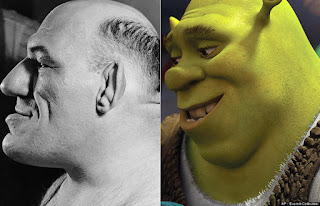Voiced by Mike Myers, Shrek is the reluctant hero of the 2001 fairy tale comedy of the same name, which was based on a children's book by William Steig about a brutish ogre with a distinctive look. Although Dreamworks, the production company behind Shrek, has neither confirmed nor denied the rumors, many believe that Shrek was inspired by a French wrestler from the 1930s and '40s named Maurice Tillet. You have to admit, it is kind of uncanny.
The French Angel
Maurice Tillet was born in 1903 in Russia to French parents who soon moved back to France to raise their son. By all accounts, he had a relatively normal childhood with no major health issues. In fact, he had such a cherubic face that he earned the nickname "The French Angel " in the course of his wrestling career, but wrestling wasn't always Tillet's dream. He initially hoped to become a lawyer. That all changed, however, shortly after his 20th birthday.
type="adsense"
data-ad-client="ca-pub-2656328684472327"
data-ad-slot="7259572561"
data-auto-format="mcrspv"
data-full-width="">
type="adsense"
data-ad-client="ca-pub-2656328684472327"
data-ad-slot="7259572561"
data-auto-format="mcrspv"
data-full-width="">
Tillet And Acromegaly
As he entered his twenties, Tillet started to notice unusual swelling in his hands, feet, and head. When the issue persisted, Tillet sought medical attention, and after running a battery of tests, the doctor gave Tillet a chilling diagnosis: He had acromegaly.
What Is Acromegaly?
Acromegaly is a medical condition that causes a benign tumor to grow on the pituitary gland in the brain. The tumor causes the pituitary gland to release excess amounts of growth hormones, which means the tremendous growth spurts that a person experiences in childhood continue unabated into adulthood in patients with acromegaly. People who suffer from acromegaly are much larger than the average adult, with bones that thicken as they lengthen. The bones in their hands, feet, and face are affected the most. As you can imagine, this greatly alters the appearance of the patient.
No Longer An Angel Face
As his acromegaly progressed, Maurice Tillet's once angelic face drastically changed. His jaw took on a square shape as it grew, protruding slightly, and his entire face broadened. His skull elongated until his ears appeared out of place. His hands and feet were gigantic, and he had to relearn how to navigate the world with giant mitts and clumsy feet.
type="adsense"
data-ad-client="ca-pub-2656328684472327"
data-ad-slot="7259572561"
data-auto-format="mcrspv"
data-full-width="">
The Wrestler
As he grew disillusioned by his diagnosis—a career in the legal profession was right out—Tillet made the acquaintance of a professional wrestler from Lithuania named Karl Pojello in 1937. Pojello was impressed by Tillet's powerful build and persuaded him to become a wrestler, even moving to Paris to train him. Tillet found moderate success as a professional wrestler in France and England until the outbreak of World War II, when he immigrated to America.
The Champ
In the early 1940s in Boston, Tillet connected with wrestling promoter Paul Bowser, and it was here where he truly flourished as a wrestler. He maintained an undefeated winning streak for more than a year and a half, holding the title of AWA World Heavyweight Champion from 1940–1942. He even inspired a slew of imitators: The Irish Angel, Russian Angel, Czech Angel, Canadian Angel, etc. Only one of them—Paul Olaffsen, the Swedish Angel—also suffered from acromegaly.
type="adsense"
data-ad-client="ca-pub-2656328684472327"
data-ad-slot="7259572561"
data-auto-format="mcrspv"
data-full-width="">
An Early Demise
Unfortunately, as with nearly all acromegaly patients, Tillet's condition cut his life short. At the age of 51, his heart and vascular system could no longer keep up with the demands of his oversize frame, and he died of cardiovascular disease on September 4, 1954 in Chicago. A few years before his death, however, Tillet allowed a Chicago-area sculptor named Louis Linck to craft several plaster busts of his face to both commemorate his wrestling career and document the effects of acromegaly. One of Linck's busts of Tillet is currently housed at the International Museum of Surgical Science in Chicago.
type="adsense"
data-ad-client="ca-pub-2656328684472327"
data-ad-slot="7259572561"
data-auto-format="mcrspv"
data-full-width="">
Does Shrek Resemble Tillet?
From these busts and photos taken of Tillet during his life, it's clear that he bears more than a passing resemblance to the lovable ogre, from the protruding jaw to the lopsided grin to the minuscule and misplaced ears. Still, there is no concrete proof that Shrek's appearance was based on Tillet. It could simply be a coincidence.
Other Acromegaly Sufferers
After all, it's not like Tillet was the only high-profile figure who suffered from acromegaly. Although the disorder is rare, its effects result in such striking features that those who suffer from it often use their appearance to make money (and often have no other choice). Andre the Giant, a fellow professional wrestler and actor best remembered for his role as the cuddly brute Fezzick in The Princess Bride, also suffered from acromegaly. Other performers afflicted with the disorder include the 6'9" Ted Cassidy, who played Lurch in The Addams Family , and Richard Keil, who played the villain Jaws in the James Bond movies The Spy Who Loved Me and Moonraker. Shrek's appearance could have been influenced by any or none of these men, and although it might be a dubious honor to inspire a literal ogre, he does have a way with the ladies (not unlike Andre the Giant himself ).
Credit: Karen Harris



